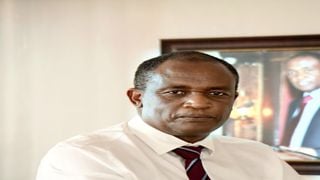
Director General Public Debt Management Office National Treasury Haron Sirima. He is on his way out and the Public Service Commission (PSC) has initiated the recruitment of his replacement.
|Business
Premium
Debt chief exits Treasury after Eurobond fallout
The Kenya Kwanza government is parting ways with the director-general in charge of debt management at the Treasury, Haron Sirima, amid escalating debt sustainability concerns that have forced the Exchequer to retreat on a plan to buy back $300 million of the $2 billion Eurobond that matures in June this year.
The former Central Bank of Kenya (CBK) Deputy Governor, who has been at the helm of the debt management unit since June 2018, confirmed his exit without divulging details surrounding his departure.
“My tour of public duty has come to an end. I need to give way to young blood. I have a couple of months to go awaiting recruitment of new director-general,” Dr Sirima said.
The Public Service Commission (PSC) has advertised several vacant positions, including that of the Director General Public Debt Management, with those interested expected to submit applications on or before February 13.
Dr Sirima recently found himself at the centre of a government attack after he told the Business Daily that Kenya would not keep the promise to make an early Eurobond repayment in December.
Last year, civil society groups, under Okoa Uchumi lobby, called on the PSC and the Treasury to break their silence over the replacement of Dr Sirima on the grounds he had reached the retirement age.
Kenya’s national debt has surpassed Sh10 trillion, with almost 50 percent of revenues going towards debt repayment.
In June last year, President William Ruto announced at the New Global Financing Pact in Paris that the government planned to buy back at least 50 percent of its $2 billion Eurobond that is maturing in June this year.
The announcement came amid rising investor concerns that the government didn’t have enough cash to meet its financial obligations due to competing priorities and a drop in its foreign exchange reserves.
And in November the President said during his State of the Nation Address in Parliament that Kenya will in December pay back $300 million of a $2 billion Eurobond.
“I can now confirm ... with confidence that we will and we shall pay the debt that has become a source of much concern to citizens and markets,” Dr Ruto said.
However, in December the Treasury said it only paid $68.7 million as interest due on the $2 billion Eurobond after it emerged that the State had dropped the initial plan to make an advance payment of the principal before the end of 2023.
Dr Sirima had signalled a U-turn from the original plan of settling part of the June maturity, indicating that the government was awaiting advice from the lead managers on a new date for the early buyback this year.
Concerns about Kenya’s ability to repay the 2024 Eurobonds were cited by rating agency Fitch in July when it reversed the outlook on the country’s debt to negative while affirming its credit rating at B or highly speculative.
The negative credit ratings from global rating agencies coupled with fiscal constraints and macroeconomic instability continue to hurt the country’s creditworthiness.
According to the International Monetary Fund (IMF) Debt Sustainability Analysis (2022) report, Kenya is already in breach of four of the six debt sustainability indicators.
These are the public debt to gross domestic product (GDP) ratio and the public debt to revenue and grants ratio.
Others are the external debt to exports ratio and the debt service to exports ratio.
“This essentially means that the country is at a significantly higher risk of debt distress,” said the Parliamentary Budget Office (PBO).
“The breach of the external debt to exports ratio is especially worrying because it implies that the country is not generating enough forex from exports to comfortably service its external debt.”
Late last year, Dr Sirima said the Treasury was not keen on buying back part of the $2 billion Eurobond, citing investors ‘strong’ confidence in the government’s fiscal policy stance.
The 10-year bond priced at 6.78 percent was issued in 2014 to fund infrastructure projects under the then Jubilee administration.
Kenya took up $2.75 billion in two tranches— a 10-year paper at 6.78 percent interest rate and a five-year paper at 5.87 percent.
The five-year issuance was repaid partly using the proceeds of another $2.1 billion Eurobond issued in May 2019. Dr Sirima said the planned buyback of a portion of the $2 billion Eurobond depended entirely on ‘market conditions and completion of documentations’ throwing bondholders off balance and leaving potential investors guessing.
In November the Treasury settled on Citi and Standard Bank as joint lead managers to advise the exchequer on the refinancing of the Eurobond.
Market conditions have been very volatile prompting the government to consider other financing options beyond floating another Eurobond.
“The government of Kenya is committed to complete the redemption in June 2024, with or without access to the capital markets,” he said.
Dr Sirima, served as CBK Deputy Governor from October 24, 2011, was appointed director-general of the debt management office in 2018 after unsuccessfully making a stab at the position of the CBK Governor.
Dr Patrick Njoroge was appointed CBK governor in 2015.




